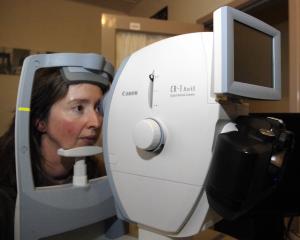After years of controversial discussion about more than two million stored blood spot cards, mostly behind closed doors, Health Minister Tony Ryall decided in 2010 they should be permanently stored.
That decision was not made public until revealed by the Otago Daily Times in April last year, and the protocols which would apply to the national metabolic screening programme were not announced until September.
Under the new rules for the programme, which have applied since June last year, parents are asked to give verbal consent to the screening and whether they want the blood spot cards handed over once the screening tests are completed.
Those who had blood stored on cards before June last year, however, would be required to give written consent for the cards to be used in any future ethics committee-approved research.
Many people are thought to be unaware the cards have been stored since the inception of the scheme in 1969.
For those who have given the required verbal consent to have their blood spot cards stored since last June, specific approval for ethics committee-approved research will not be necessary as the new consent process covers that.
Stored cards can be requested by parents or those whose blood is on them (when they are 16 or older) at any time, regardless of what decision was made about them initially.
When the Otago Daily Times asked the National Screening Unit if there would be any future programme to check with parents or their children to see if they were still happy to have the cards stored, perhaps when the child turned 16, the unit said information about storage was available in the pamphlet for parents and on the NSU website.
Relevant information was given to women during pregnancy by their lead maternity carer.
When it was suggested by the ODT parents might be unlikely to visit this portion of the website a few years after the birth of a child, the NSU said parents, guardians and children accessed information and sent queries to the unit directly and through the website.
"These queries include requests for blood spot cards over a range of time frames [i.e. months to more than 20 years later] following newborn metabolic screening."
Earlier, the NSU said as part of its ongoing education the unit conveyed key messages about the programme to various organisations and practitioners. This could include articles in parenting magazines and professional organisation newsletters.
Asked if there would be any means of informing post-June 2011 blood spot card owners of the type of research which might be proposed so they could remove their cards if they were uncomfortable with what was proposed, the answer appeared to be no.
The NSU stated the lead maternity carers would discuss with mothers and families the potential uses of the cards, if stored, including for research.
"It is important to note that, to date, blood spot cards have not been used for large-scale population studies. Any research proposal must have approval from an ethics committee, the newborn metabolic programme governance team and the Ministry of Health."
The programme started including research requests in its annual report last year.
The NSU pointed out since the programme began there had been only two research requests for access to the cards, which are also known as Guthrie cards. One involved an HIV-prevalence study using blood spot cards which did not reveal the identities of the owners.
This request was declined, as it was believed that identified information should be used.
The second was to search for links between sudden unexplained death in infancy and an inherited heart defect with a known genetic mutation.
This, too, was to have used blood spot cards which did not reveal the identities of owners or involve owners' further consent, but was declined by an ethics committee, as it was believed families must be informed if a mutation was found.
This research had since been embarked upon under the auspices of the New Zealand Cot Death Association, which offered parents an opportunity to participate in research with their fully informed consent.
A scan of the literature on population research carried out using blood spot samples elsewhere showed this type of research was infrequent. Most studies were small-scale and used identified samples to examine disease prevalence or environmental toxin levels, the NSU said.
It was suggested by the ODT pre-June 2011 card owners would have a higher level of choice regarding their participation in research than their post-June 2011 counterparts and it was asked whether this was appropriate from a human rights point of view.
The NSU response was that some of those with pre-June 2011 cards may not have been provided with complete information so their consent would be required.
Dean of law at the University of Otago and principal investigator for the Human Genome Research Project Prof Mark Henaghan said it remained to be seen what impact the recent decisions relating to the storage and use of the cards might have.
There was a risk the screening programme could be slowly undermined if people perceived their blood spot cards were going to be used for certain types of research and they had "kind of lost control" over a small part of their DNA.
He has previously been critical of the amount of public discussion over the future management and use of the cards.
• In response to queries about whether there would be another consumer representative on the screening programme's governance team, apart from John Forman, who represents the Rare Disorders Association, the unit said the new Pacific adviser, Prof Peggy Fairbairn-Dunlop, was also a consumer representative and this would be made clear on its website.
The ODT understands it was earlier suggested there would be a consumer representative from Plunket or Parents Centre.










